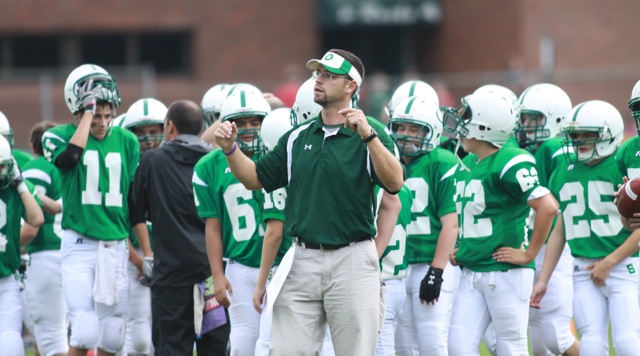Uniform colors and head coaches pacing the sidelines do not matter one bit to the Mid-Penn Conference and Tri-Valley League’s football officials’ assigner.
“The greatest thing in the world,” White said, “is to be standing on the field at 7 o’clock on a Friday night, listening to a band play ’The Star-Spangled Banner’ and getting ready for kickoff.”
White is working his 38th season as a football official, and he would like nothing better than to add a few more stripes to the herd.
As veteran officials age, the need for younger referees, linesmen, back judges, line judges and umpires increases.
“It’s something people should be concerned about,” said Pat Gebhart, assistant executive director of the PIAA and a longtime basketball referee. “Any Friday night you go to a game, take a look at the age of the officials. Those guys won’t be working forever. Who’s going to be there to take their spot when they retire?
“Many of the area chapters’ more-seasoned officials at the top of their games right now will be retiring in a few years — for whatever the reason — and that’s why we need to recruit and develop replacements. I know the schools are concerned about it.”
According to Gebhart, District 3 currently has 3,250 certified officials in all sports, and 435 of them are football officials.
White is a member of the Capital Area Chapter of PIAA Football Officials, one of five such chapters encompassing District 3. He’s responsible to assigning five officials to work Mid-Penn Conference home games each week.
With the league consisting of 32 schools spread over nine counties, White needs a good base of officials to work with. Fortunately, he said, numbers right now are strong.
The chapter currently boasts 125, plus another 30 in the South Penn chapter that works Mid-Penn games in the Chambersburg area. But there’s always the need for an influx of new officials.
While White could not give an exact count, he estimated between 45 and 50 percent of his chapter’s current officials were 50 years or older.
Rich Czarnecki, a 38-year veteran official himself, represents the men in stripes on District 3’s board of directors. He said the Capital Area chapter has always made an effort to attract fresh faces.
“We put ads in the paper and run a school for officials as a lot of chapters do,” said Czarnecki, who helped administer a PIAA-authorized officials exam last week at Trinity High School. “We try to get guys interested in taking part, but we can’t control who comes in.
“We get a lot of older guys, but we’re wishing we could get college–age guys or people who just graduated from high school.”
When applicants pass the PIAA exam and obtain the necessary background-check clearances, they join District 3 chapters such as the Capital Area, South Penn, York-Adams, Lancaster-Lebanon or Berks.
“They’ll start doing youth football games on Sundays,” Czarnecki said. “Our assigner for the Mid-Penn Conference, Jeff White, does a good job bringing guys along. He’ll start them on youth games for a year or two.
“The chapter sends observers to see the new guys, and they report back to Jeff on how they’re progressing. Some get the hang of it, some don’t.”
It’s that process — and a lack of patience — that causes some officials to get out of the business before reaching the varsity level.
“That’s one of the reasons we experience a little bit of a dip [in numbers] at times,” Czarnecki said. “My personal feeling is guys in their second year want to work varsity games, but we’re trying to protect them. Many of them can’t handle it yet, so we’re trying to bring them up slowly.
“If you’re still waiting [for varsity action] in your fourth year, don’t worry. You’re right on track. But not all guys understand that.”
RECRUITING TRAIL
Because officials retire and drop out each year, the need for replacements is critical to keep up with the demand for youth football, middle school, JV and varsity games.
Mid-Penn Conference Executive Director Fred Isopi said his league helps the recruiting process as much as possible, though changing times have made it challenging.
“In the past, we helped with financial support, but that’s difficult now with our budget,” Isopi said. “Schools are hurting, and I really don’t know how much we can financially support the process of recruiting and training.
“The most critical sport where we’re really hurting for officials is field hockey. That’s the sport with the fewest number of officials. When it rains and games are postponed, schools can’t reschedule until they talk to the assigner to make sure she has enough officials to work a make-up day. If she doesn’t, those games aren’t getting played.”
It hasn’t come close to that sort of shortage in football, although White said the Capital Area chapter’s membership dwindled to 100 before rebounding in recent years.
In the Mid-Penn Conference, varsity officials make $90 per game. That fee is $77 for JV and freshman games, $77 for middle school games and $48 for officials working the chains and line-of-scrimmage markers.
Officials working multiple games each weekend can make a decent part-time income.
“Things have changed as the fees have escalated over the years,” said District 3 football chairman John Ziegler, the former Newport High School athletic director. “I’d say that 30 years ago, money wasn’t really a factor. People just looked at it as secondary income for vacations and whatnot.
“Back then, there were guys who wouldn’t cash their checks until the end of the season and deposit it all at once. But in today’s economy, people need the money from each game they officiate.”
White said there was a time when teachers made up a large chunk of the Capital Area football officials’ chapter. That’s not the case anymore.
“Only a handful are teachers now,” White said. “I remember when they would leave school early to work JV and junior high games. But it’s hard now to get professional workers to do it because they can’t get time off from work. Financially, it’s not worth it.
“Wrestling and field hockey are really hurting for officials, but we’ve had an upsurge in football. It might just be that people are finding it’s a good way to make extra money. We’re paid well for what we do.”
WHERE TO GET ’EM?
Isopi said future officials might very well come from area colleges.
“I think they would be the biggest hotbeds for recruiting new officials for all sports,” Isopi said. “Messiah College would be a natural for soccer. There should be plenty of people available at Elizabethtown and Millersville, too.
“I tell any college kid locally I know, being an official is a great job. It’s a lot better than flipping hamburgers.”
Lower Dauphin football coach Rob Klock said he has spoken to his Falcons players about possible careers as officials after they graduate from high school.
“It’s a great way to stay involved in athletics and help keep a part of our society intact, which we really need,” Klock said.
The next generation of officials can come from anywhere, but White said current athletes should be prime targets.
“I’d suggest it to college football players about to graduate from NCAA Division I-AA and Division II and III schools who aren’t turning pro,” White said. “As an official, you can stay in the game and set your own hours as opposed to becoming a coach, which requires a lot more time.
“If you love the game and love being part of a team, being an official is perfect, because there are four other guys out there with me each game. That’s the team concept, and I’ve probably made some of my closest friends doing this at the high school and Division I-AA college level.”







